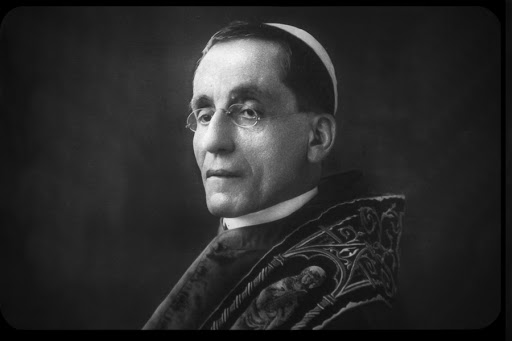A hundred years ago, millions of European Christians greeted the arrival of war with a degree of acceptance, even rejoicing, that in hindsight seems hard to credit.
For Germans especially, this was a moment of Transfiguration, a New Pentecost. Other countries saw a fulfillment of prophecy, an apocalyptic sign. Among all the world’s churches, it is difficult to find leaders who spoke out as we would have wished a Christian statesman to have done in those appalling circumstances. With some relief, though, we can turn to one man who actually did speak as a prophet, and who moreover offered a genuinely realistic vision for peace.
Under Pope Benedict XV (1854-1922), the Vatican became a center for effective Christian peace activism. Benedict took office on September 3, 1914, a nightmare moment in European history. (The death of his predecessor, Pius X, had been accelerated by the strains and fears driven by the onset of war). German armies were advancing on Paris, and the titanic Battle of the Marne was only days away. Already the end of the year, two million soldiers would lie dead, overwhelmingly Christians killed by other Christians.
What would we expect a pope to do in these circumstances? The first thing, of course, was to lament the carnage, and plead for an end to violence, and this Benedict did repeatedly. Within a week of his accession, he condemned “the appalling spectacle of this war that has filled the heart with horror and bitterness, observing all parts of Europe, devastated by fire and steel, reddened with the blood of Christians.” War was “the bane of God’s wrath.”
In November 1914, he protested, “There is no limit to the measure of ruin and of slaughter; day by day the earth is drenched with newly-shed blood, and is covered with the bodies of the wounded and of the slain. Who would imagine, as we see them thus filled with hatred of one another, that they are all of one common stock, all of the same nature, all members of the same human society? Who would recognize brothers, whose Father is in Heaven?”
In 1916, he famously lamented “the suicide of civilized Europe.”
Benedict also offered strictly practical plans for limiting the conflict. In 1914, he urged at least a temporary Christmas ceasefire so the cannon should not be booming on the night that angels sang. But his greatest contribution came in August 1917, at a time when all the combatant powers were facing exhaustion and demoralization — a time of hunger, and deep unrest across the continent. At that catastrophic moment, he offered a peace proposal that, when we consider how events actually played out, sounds like a near-utopian alternative.
Claiming to speak from a position of total impartiality, Benedict called for a peace without victors or losers. Rival states would cease fighting and restore all the territories they had conquered, leaving disputed claims to arbitration. Most basically, though,
Once disarmed, European nations would use the money saved for social reconstruction.
Benedict’s new global order would recognize the freedom of the seas, and acknowledge the rights of smaller nations:
Benedict even favored ending military conscription, which in the European context of the time would have constituted a social revolution.
Although Benedict’s proposal failed in its goals, the warring powers treated it as a serious basis for negotiation. Under its new Emperor Karl, Austria-Hungary briefly leaned towards acceptance. The trouble was that, even after such disastrous losses, each Power believed that it could glimpse a vision of final victory, that it could last long enough to see its rivals collapse, and survive as the last military man standing.
Also, years of propaganda had whipped each nation into believing that its enemies were diabolical foes with whom no compromise was possible. In his implacable poem “The Holy War,” Rudyard Kipling denounced the credulous idiocy of “the Pope, the swithering neutrals” who failed to recognize the apocalyptic character of the struggle. Ultimately, the Powers rejected peace, and the world had to endure another year of massacre.
In retrospect, though, Benedict’s ideas impress by their practicality. If his principles sound familiar, that is because they were substantially incorporated into Woodrow Wilson’s Fourteen Points of the following year, which supplied the terms on which the defeated Germans finally accepted an Armistice. Carried out on the lines Benedict envisaged, his 1917 scheme might well have avoided the disasters of the post-1918 world, and even the Second World War.
In 2005, when Joseph Ratzinger became Pope, he took the name of that very great predecessor who had tried to bring peace to a deeply divided Europe. He was paying due acknowledgment to one of the best popes of modern times. His is an excellent name to remember in this centennial year.
Philip Jenkins is a Distinguished Professor of History at Baylor University and author of The Great and Holy War: How World War I Became a Religious Crusade.

